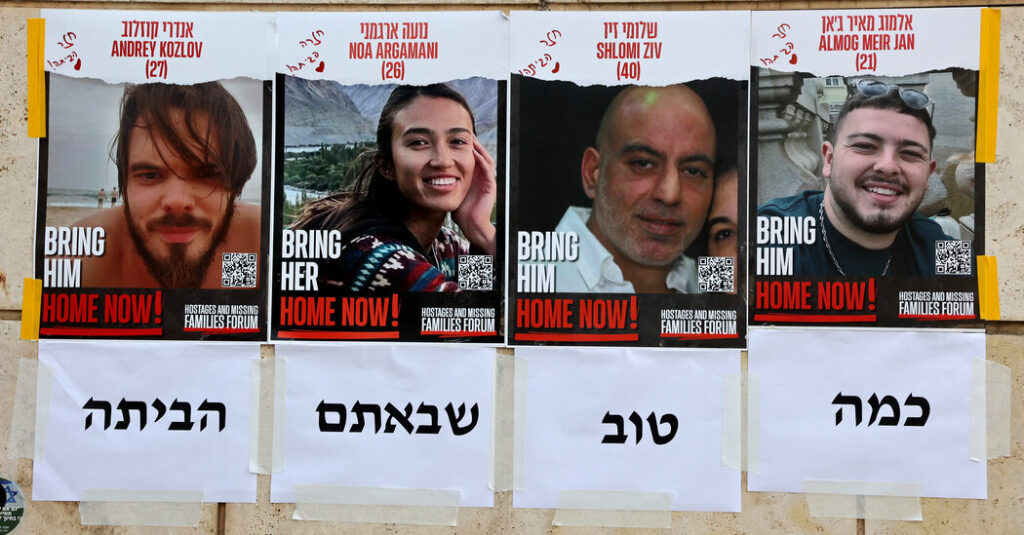After Israel rescued four hostages in Gaza on Saturday, the Israeli military said three of the hostages were being held in the home of a Hamas member, a sign that the armed group is using civilian homes to cover its activities.
On Saturday, Israeli special forces, backed by the military, intelligence services and air force, raided two buildings near the Nuserat refugee camp in central Gaza and rescued 22-year-old Almog Meir Young. Meir Jan); Andrei Kozlov, 27; and Shlomi Ziv, 41, from the home of Abdallah Aljamal, the military said. A fourth hostage, Noa Argamani, 26, was also released, apparently from a nearby building.
According to Gaza’s health ministry, more than 274 people were killed in the attack. The Israeli military said the death toll was less than 100.
Al-Gamal’s death was confirmed on Sunday by the Gaza government media office, which said he worked for the Hamas-affiliated news agency Palestine Today.
The Israeli military said in a statement on the Telegram messaging app on Sunday: “The hostages were held in the home of Abdullah Al-Gamal and his family. This is further evidence of the Hamas terror group’s deliberate use of civilian homes and buildings. to take Israeli hostages in the Gaza Strip.
The Israeli military has said for months that civilian casualties in Gaza were inevitable because Hamas hid its forces among the population.
However, on Monday, the Israeli military appeared to retract a post made a day earlier on the X platform, formerly Twitter, which suggested Mr Aljamal was A Journalist for Al Jazeera, an influential news organization based in Qatar.
In that post, the military showed a screenshot of Mr. Aljamal’s photo and profile on the news agency’s website. “No journalistic vest will exonerate him,” the post read, adding, “Al Jazeera: What did this terrorist do on your website.”
Al Jazeera on Sunday dismissed the accusations, saying “these accusations are completely unfounded” and that Mr Aljamal “has never worked for the network”. Instead, it said, he contributed to an op-ed in 2019. Narratives of six Palestinians. News organizations often publish opinion pieces from writers who are not employees and have no ongoing contractual relationship with them.
Al Jazeera, the main news source in the Arab world, has highlighted the suffering of civilians in Gaza. Israeli Prime Minister Benjamin Netanyahu accused the group of endangering Israel’s security and inciting violence against Israeli soldiers. The news organization has been temporarily banned from operating in Israel since May 5, an unusual move that critics have decried as anti-democratic and part of a broader crackdown on dissent in Israel’s Hamas war in Gaza part.
A 35-day ban on Al Jazeera’s operations in Israel was extended by a further 45 days last Wednesday after the Israeli cabinet agreed that its broadcasts posed a security threat.
On Monday, the Israeli military said it had no comment on Al Jazeera’s rebuttal and referred a Times reporter to the Sunday Telegraph post, which only identified Algamal as a Hamas member. However, Israel’s Foreign Ministry continued to amplify accusations of his ties to Al Jazeera, retweeting a New York Post report on Monday that cited the military’s Sunday post on X.
It could not be independently determined whether the hostages were being held at Mr. Aljamal’s home and, if so, under what circumstances.
Given that Abdullah Al-Gamal is a relatively common name in Gaza, it is also not certain that the person who wrote the op-ed is the same person whose home the Israeli military says was used to hold hostages.
According to preliminary estimates by the Committee to Protect Journalists, the Israeli offensive in Gaza has killed more than 100 journalists and media workers since Hamas launched its attack on Israel on October 7. It said Palestinian journalists had suffered unprecedented losses.
Israeli officials have said they believe some of the journalists are also members of Hamas, a claim that casts doubt on the neutrality of some reporting by Palestinian journalists. With foreign media barred from the enclave except for special visits closely monitored by the military, Palestinian journalists have become an important source of information on the war prosecution and its impact on civilians.
Aaron Boxerman Contributed reporting.

